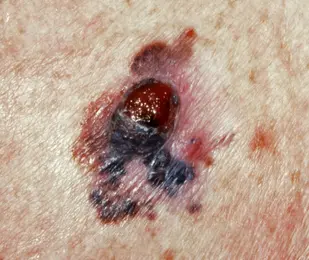Dermato-Onkologie
- NCT
- Zell- und Tumorbiologie
- Klinische Kooperationseinheit

Prof. Dr. Jochen Utikal
Die Klinische Kooperationseinheit für Dermato-Onkologie befasst sich mit der Vorbeugung, Diagnose und Therapie von Hauttumoren und überträgt ihre Forschungsergebnisse direkt in die Klinik.

Unsere Forschung
Schwerpunkt ist das maligne Melanom, ein bösartiger Tumor, der von Pigmentzellen der Haut ausgeht. Die Klinische Kooperationseinheit für Dermato-Onkologie führt verschiedene translationale Forschungsprojekte durch. So werden zahlreiche klinische Phase I - IV Studien mit innovativen Melanomtherapien angeboten.
Die translationale Forschung der Abteilung konzentriert sich auf zelluläre Plastizität von Melanomzellen, auf die Targetidentifizierung um Resistenzmechanismen zu verhindern, auf immunsuppressive Mechanismen in den Tumoren sowie auf die Erforschung von neuen Biomarkern beim malignen Melanom.
Projekte
Die Therapie von fortgeschrittenen Hauttumoren, insbesondere beim malignen Melanom und beim kutanen Lymphom ist oftmals schwierig. Die Entwicklung innovativer Therapieansätze ist von wichtiger Bedeutung. Neben der präklinischen und translationalen Forschung, die in unserer Abteilung betrieben wird, wird den Patienten hier die Betreuung von der Erstdiagnose über die Nachsorge hin bis zur Behandlung in fortgeschrittenen Krankheitsstadien angeboten. Hierfür steht ein Team erfahrener Dermatoonkologen zur Verfügung.
Am Hauttumorzentrum Mannheim bieten wir Therapiestudien der Arbeitsgemeinschaft für Dermatoonkologie (ADO), der European Organisation for Research and Treatment of Cancer (EORTC), durch Firmen gesponserte Therapiestudien sowie sogenannte Investigator Initiated Clinical Trials an. Unser Studienteam hat dabei umfangreiche Erfahrung, Studien auf höchsten internationalen Standards durchzuführen.
Klinische Studien der KKE Dermato-Onkologie (Download)
Krebs entwickelt sich in der Regel später im Leben durch unkontrolliertes Wachstum mutierter Zellen, die der Immunüberwachung entkommen – ein vielschichtiger Prozess von Wechselwirkungen zwischen Geweben und Immunzellen. Die selektive Manipulation einiger dieser regulatorischen Signalwege hat zum bahnbrechenden Erfolg der Immun-Checkpoint-Blockade geführt, zunächst beim Melanom und nun auch bei einer wachsenden Zahl anderer solider Tumoren. Dennoch profitieren nur ein Bruchteil der Patienten von diesen Immuntherapien der ersten Generation, was den dringenden Bedarf verdeutlicht, die Mechanismen der Krebs-Immunflucht besser zu verstehen – aber auch neue, krebspezifische Behandlungsansätze zu entwickeln.
Deshalb interessiert uns die detaillierte Untersuchung des Tumormikromilieus (TME), da hier die Krebs-Immunüberwachung in hohem Maße moduliert wird. Aber auch die Bestimmung der Immunzellzusammensetzung in der Peripherie bietet einen guten Spiegel dessen, was im Tumor passiert und ermöglicht beispielsweise minimalinvasive Immunüberwachungen in klinischen Studien. Wir nutzen eine Vielzahl von Immunüberwachungstools in Kombination mit detaillierten klinischen Metadaten, um Biomarkermodelle zu entwickeln, die den klinischen Ausgang bei Hautkrebs genau vorhersagen.
Da die Krebsabstoßung weitgehend den T-Zellen zugeschrieben wird, liegt ein Hauptfokus unserer Forschung auf der Identifizierung und funktionellen Untersuchung von T-Zell-Signaturen, die Tumor-assoziierte Antigene im Hautkrebs erkennen, sowie deren suppressiven Gegenstücken, wie myeloide suppressor Zellen (MDSCs), regulatorischen T-Zellen und anderen immunsuppressiven Zelluntergruppen. Durch das Studium dieser komplexen Interaktionsmuster möchten wir neue Erkenntnisse über Mechanismen der Krebs-Immunüberwachung gewinnen und dieses Wissen in neue therapeutische Ansätze übersetzen.
Als Mitglied des Forschungskonsortiums FOR2799 „Empfangen und Übersetzen von Signalen über den γδ T-Zell-Rezeptor“ liegt ein wesentlicher Fokus unserer Forschung auf der Untersuchung der Rolle von γδ T-Zellen bei der Krebsabstoßung unter Immun-Checkpoint-Blockade.
Basierend auf einer Biobank, die humane Melanom-Serum/Plasma/PBMCs und Gewebeproben sowie klinische Daten umfasst, suchen wir derzeit nach neuen Biomarkern, die den Krankheitsverlauf (auch subklinisch), das Ansprechen auf Therapien und die Prognose vorhersagen können.
Klinische Studien
Für Studienanfragen steht Ihnen unser Dermato-Onkologisches Team zur Verfügung.
Tel. +49 621 383-4450 oder +49 621 383-3905
Das Team der KKE Dermato-Onkologie
Studienbüro/ Sekretariat/ Tumordokumentation
Funda Arslan/ Seda Resuloglu/ Beate Eisenecker
E-Mail: funda.arslan@dkfz-heidelberg.de; seda.resuloglu@dkfz-heidelberg.de
Tel. +49 621 383-3905/ -6489 Fax: +49 621 383-2163
Hauttumor-Ambulanz
E-Mail: Hautklinik-Dermato-Onkologie@umm.de
Tel. +49 621 383-2282 Fax: +49 621 383-3815
-

Prof. Dr. Jochen Utikal
Abteilungsleiter
-
Prof. Dr. Viktor Umansky
Arbeitsgruppenleiter
-
Priv. Doz. Dr. Kilian Wistuba-Hamprecht
Arbeitsgruppenleiter
-
Priv. Doz. Dr. Sebastian Wohlfeil
Arbeitsgruppenleiter
-
Prof. Dr. Jan Nicolay
Arbeitsgruppenleiter
Wissenschaftl. Mitarbeiter:
Dr. med. Danai-Dionysia Kanatoula
Dr. rer. nat. Daniel Novak
Dr. med. Pia Nagel
Dr. rer. nat. Qian Sun
Dr. med. Sonja Simon
Dr. med. Susanne Melchers
Technische Mitarbeiter:
Sayran Arif-Said
Yvonne Nowak
Marlene Pach
Diana Vobis
Doktoranden:
Cagla Ak, MD student
Jonas Bochem, PhD student
Xuhong Liu, MD student
Sandra Pardo Valencia, PhD student
Vera Petrova, MD student
Noah Schmidt, PhD student
Nina Wang, MD student
Yiman Wang, MD student
Yuxin Zhang, MD student
Sarah Beyer, M.Sc. student
Ausgewählte Publikationen
Lasser SA, Ozbay Kurt FG, Arkhypov I, Utikal J, Umansky V.
Özbay Kurt FG, Cicortas BA, Balzasch BM, De la Torre C, Ast V, Tavukcuoglu E, Ak C, Wohlfeil SA, Cerwenka A, Utikal J, Umansky V.
Wohlfeil SA, Kranzmann L, Weiß C, von Wasielewski I, Klespe KC, Kähler KC, Weichenthal M, Schadendorf D, Zimmer L, Mohr P, Meier F, Pfoehler C, Berking C, Heppt MV, Herbst R, Kreuter A, Gutzmer R, Ulrich J, Meiss F, Gebhardt C, Dippel E, Leiter U, Schilling B, Ugurel S, Utikal J.
Ozbay Kurt FG, Lasser S, Arkhypov I, Utikal J, Umansky V.
Steinfass T, Poelchen J, Sun Q, Mastrogiulio G, Novak D, Vierthaler M, Pardo S, Federico A, Hüser L, Hielscher T, Carretero R, Offringa R, Altevogt P, Umansky V, Utikal J.
Anfahrt
Unsere Abteilung befindet sich an zwei verschiedenen Standorten:
Mannheim
Am Universitätsklinikum Mannheim befinden sich die klinisch arbeitenden Mitarbeiter sowie das Studienzentrum im Haus 26/27.
KKE Dermato-Onkologie
Universitätsklinikum Mannheim
Haus 26/27
Theodor-Kutzer-Ufer 1-3
D-68167 Mannheim
Heidelberg
Im DKFZ Heidelberg befinden sich die wissenschaftlichen Mitarbeiter (Haupthaus, 6. Stock)
KKE Dermato-Onkologie
DKFZ
Im Neuenheimer Feld 280
D-69120 Heidelberg
Kontaktieren Sie uns


